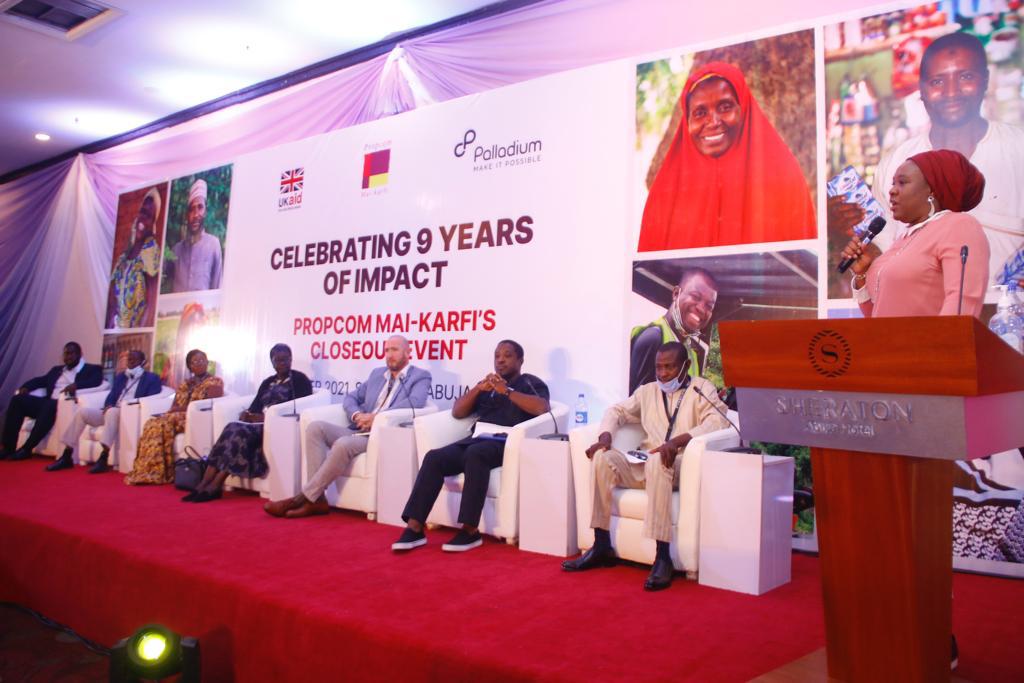United Kingdom has supported over 1.25 million women and men in Northern Nigeria to generate over N37 billion in income over the past nine years.
The programme under the UKaid has sponsored Propcom Mai-karfi to help smallholder farmers in Nigeria’s rural communities in the North.
This was disclosed in Abuja on Thursday during the hosting of the closing event of the project by Propcom Mai-karfi.
The ceremony had in attendance key stakeholders in the agriculture sector, including the Deputy High Commissioner in Lagos, Ben Llewellyn-Jones, representatives of the UK Government and other donor agencies, commissioners of agriculture in implementing states, development sector partners, private sector stakeholders and civil society organisations.
Programme staff explained how the UK Government’s investment in agriculture has expanded market access and catalysed private sector investments to create economic opportunities for smallholder farmers in Northern Nigeria.
The event provided a platform for Propcom Mai-karfi to tell its story of impact and to advance discussions on sustaining successes recorded over the years. Strategies for promoting inclusive business models for the private sector, prospects for transformation of the public sector, and opportunities for donors and development partners to improve the effectiveness and efficiency of development support into the region were shared.
Speaking at the ceremony, the UK’s Deputy High Commissioner in Lagos, Ben Llewellyn-Jones, said:“We are very pleased to be able to celebrate today with all our partners the impact Propcom Mai-Karfi has made in Northern Nigeria over the last nine years. Its success has only been possible due to the drive, motivation, and willingness of our partners to adopt the market-driven approaches that ultimately create greater economic opportunities for poor men and women. The UK remains committed to supporting inclusive and climate resilient growth in Nigeria, and we look forward to continuing these partnerships.”
On her part, the Commissioner of Agriculture, Kaduna State, Hajiya Halima Lawal said: “I want to applaud the UK Government and to offer my congratulations to the entire Propcom Mai-karfi team for the considerable achievements in developing agriculture over the years, especially in promoting pro-poor opportunities and inclusive market growth in Northern Nigeria, and thereby improving the livelihood of citizens in our State and the region. As a State, we remain committed to facilitating and attracting investments and look forward with keen anticipation to future collaborations with the UK government.”
The National Team Leader, Propcom Mai-karfi, Kevin Gager, said: “Defining and/or sustaining various paths to economic recovery and growth demands that existing knowledge and experiences be accounted for in the process. Propcom’s closing event offered up our wealth of experience for everyone to share in the future development efforts in Northern Nigeria.”
He explained that Propcom Mai-karfi deployed the ‘Making Markets Work for the Poor – M4P’ approach which focuses on tackling the constraints that affect the markets that poor people participate in so that they can derive higher benefits and values from better functioning market systems.
He said the programme targeted market systems with opportunities for poor farmers. It identified factors causing them to perform poorly and facilitated relevant players in the markets to address those underlying constraints. In so doing, Propcom helped to build the capacity of smallholders in climate smart agriculture and helped to provide the knowledge for them to improve their productivity and overall production.
He said by helping smallholders generate increased income, the Programme stimulated economic recovery in Northern Nigeria to the tune of N37 billion in public and private sector investment.
The Deputy Team Leader, Propcom Mai-karfi, Ogheneovo Ugbebor said: “At the heart of Propcom Mai-karfi was sustainability. The Programme assumed only a facilitatory role, never direct delivery, thereby allowing key actors to drive the process from the outset. Importantly, Propcom’s intervention designs and strategies were built on the motivation and incentives of key players to act now and in the future, creating the needed drive for continuity. In its facilitative capacity, Propcom sustainably expanded market access to agricultural inputs and services, trade linkages and fostered business and regulatory reforms leveraging billions of Naira in investments from the public and private sectors.”
Propcom Mai-karfi is a market development programme funded by the UK Government and managed by Palladium International. The Programme uses a market engagement approach in which the core focus is to tackle systemic constraints in markets to unlock opportunities for target beneficiaries in the North of Nigeria. Starting in 2012, the Programme was initially implemented in all 19 Northern states. By April 2018 the focus shifted to the 6 Northeast states and Kaduna, Kano and Jigawa.
In the last three years of implementation, the Programme’s objectives were to drive economic recovery in conflict affected regions by promoting successful inclusive business models, help smallholder farmers build their resilience against climate change through access to and adoption of climate smart technologies and practices, and continue to foster inclusion of women and people with disabilities.
These objectives were achieved through select interventions across 6 market areas – agricultural inputs, mechanisation, aggregation/storage and offtake, climate smart agricultural initiatives, poultry, and livestock, and cross-cutting – access to finance and extension services.
The market engagement approach was adapted to increasingly focus on post-conflict affected areas in the Northeast. This was to enable beneficiaries to re-engage in sustainable livelihood activities and disengage from dependency on the direct delivery of support from local, national, and international agencies.
Primarily working with private sector businesses, some international non-governmental organisations (INGOs), non-governmental organisations (NGOs) and some government agencies, the Programme sought to identify constraints and drive opportunities in market systems for the benefit of poor people.


